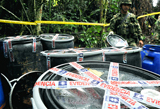Ecuadoran President Rafael Correa said on Saturday he was sending more troops to the border with Colombia to stop paramilitaries from crossing and unsettling the area, and called on Bogota to better patrol its side of the border.
“We’re taking very drastic steps because the situation is also tremendously drastic,” Correa said.
Quito and Bogota broke off diplomatic relations a year ago over a Colombian military attack on a Revolutionary Armed Forces of Colombia (FARC) camp inside Ecuador that killed 25 people. To resume relations, Correa is demanding permanent border patrols by Colombia.

PHOTO: AFP
Colombia has accused Correa, a leftist socialist leader and close ally of Venezuelan President Hugo Chavez, of providing a safe haven to the FARC.
Correa said Ecuador’s border provinces were being infiltrated by deserters of the right-wing United Self-Defense Forces of Colombia paramilitary group, who bring with them weapons. All gun permits in the area, he said, have been suspended.
“There were people in Esmeraldas [Province] with automatic weapons. That’s crazy,” Correa said.
Ecuadoran Security Minister Miguel Carvajal said 3,000 additional troops were being deployed to the 720km border with Colombia, where 7,000 soldiers and 3,541 police are already stationed.
He said five new military bases and 10 police stations would be built in the area.
Correa also accused Colombian President Alvaro Uribe of having lied last year about the attack last year on the FARC camp that killed FARC deputy leader Raul Reyes.
“President Uribe calls me ... tells me there’s been a clash ... between the Colombian Armed Forces and FARC ... that in that fight the FARC fled to our territory and that in pursuing them, 10 or 17 guerrillas were killed, 11 were made prisoners and one Colombian soldier died,” Correa said.
“That was the lie President Uribe told,” Correa said, adding that the Colombian attack was really a bombing raid on the guerrilla base.
“They didn’t tell us it was a bombing raid inside our territory that was planned, deliberate, ordered by President Uribe himself,” he said. “Everything Uribe said was a lie. The only truth he [told] was that Raul Reyes was dead.”

When Shanghai-based designer Guo Qingshan posted a vacation photo on Valentine’s Day and captioned it “Puppy Mountain,” it became a sensation in China and even created a tourist destination. Guo had gone on a hike while visiting his hometown of Yichang in central China’s Hubei Province late last month. When reviewing the photographs, he saw something he had not noticed before: A mountain shaped like a dog’s head rested on the ground next to the Yangtze River, its snout perched at the water’s edge. “It was so magical and cute. I was so excited and happy when I discovered it,” Guo said.

Chinese authorities said they began live-fire exercises in the Gulf of Tonkin on Monday, only days after Vietnam announced a new line marking what it considers its territory in the body of water between the nations. The Chinese Maritime Safety Administration said the exercises would be focused on the Beibu Gulf area, closer to the Chinese side of the Gulf of Tonkin, and would run until tomorrow evening. It gave no further details, but the drills follow an announcement last week by Vietnam establishing a baseline used to calculate the width of its territorial waters in the Gulf of Tonkin. State-run Vietnam News

TURNAROUND: The Liberal Party had trailed the Conservatives by a wide margin, but that was before Trump threatened to make Canada the US’ 51st state Canada’s ruling Liberals, who a few weeks ago looked certain to lose an election this year, are mounting a major comeback amid the threat of US tariffs and are tied with their rival Conservatives, according to three new polls. An Ipsos survey released late on Tuesday showed that the left-leaning Liberals have 38 percent public support and the official opposition center-right Conservatives have 36 percent. The Liberals have overturned a 26-point deficit in six weeks, and run advertisements comparing the Conservative leader to Trump. The Conservative strategy had long been to attack unpopular Canadian Prime Minister Justin Trudeau, but last month he

Four decades after they were forced apart, US-raised Adamary Garcia and her birth mother on Saturday fell into each other’s arms at the airport in Santiago, Chile. Without speaking, they embraced tearfully: A rare reunification for one the thousands of Chileans taken from their mothers as babies and given up for adoption abroad. “The worst is over,” Edita Bizama, 64, said as she beheld her daughter for the first time since her birth 41 years ago. Garcia had flown to Santiago with four other women born in Chile and adopted in the US. Reports have estimated there were 20,000 such cases from 1950 to